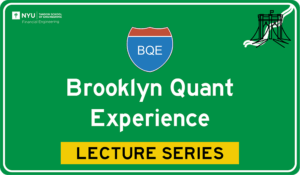
Welcome back to the spring 2021 semester. We hope that you all are doing well and look forward to a productive year.
Below please find the first BQE Lecture Series scheduled this semester. Kindly note that we have changed the time to 9:30 AM on Thursdays. The new time change allows our invited international guests to join these important virtual talks.
Keith Lewis, Managing Member of KALX, LLC, will give the following talk on Thursday, February 4th at 9:30 AM EST.
Meeting ID: 953 8089 0352
Password: FREBQEKL
Title
A Unified Model of Derivative Securities
Abstract
Market instruments can be bought or sold at a price and ownership entails cash flows. Shares of instruments can be traded based on available information that accrue to positions. The mark-to-market value and amounts involved with trading correspond to price and cash flows. The Unified Model demonstrates the connection between dynamic trading and how to value, hedge, and manage the risk of a derivative security. It can be used for any portfolio of instruments. Every arbitrage-free model of prices and cash flows is parameterized by a vector-valued martingale whose components are indexed by market instruments and a positive, adapted process called a deflator. If repurchase agreements are available they determine a canonical deflator.
Bio
Keith A. Lewis started his professional career as a J. D. Tamarkin assistant professor at Brown where he pioneered the use of computers as a classroom tool in mathematics. He went on to a Wall Street career at Bankers Trust, Morgan Stanley, and Banc of America Securities where his team built the equity derivative libraries used by the trading desk to run their business. Since 2002 Keith has been a consultant for hedge funds building valuation models and tools for exploring, testing, and implementing trading strategies. Other projects include insurance companies involved with GPU computing, law firms certifying tax conformance of trades, and municipal bond advance refunding. He has spun off a number of open source projects based on his experience with building tools his clients found useful and has been using them in courses he has taught at NYU, Rutgers, Cornell, and Columbia.


